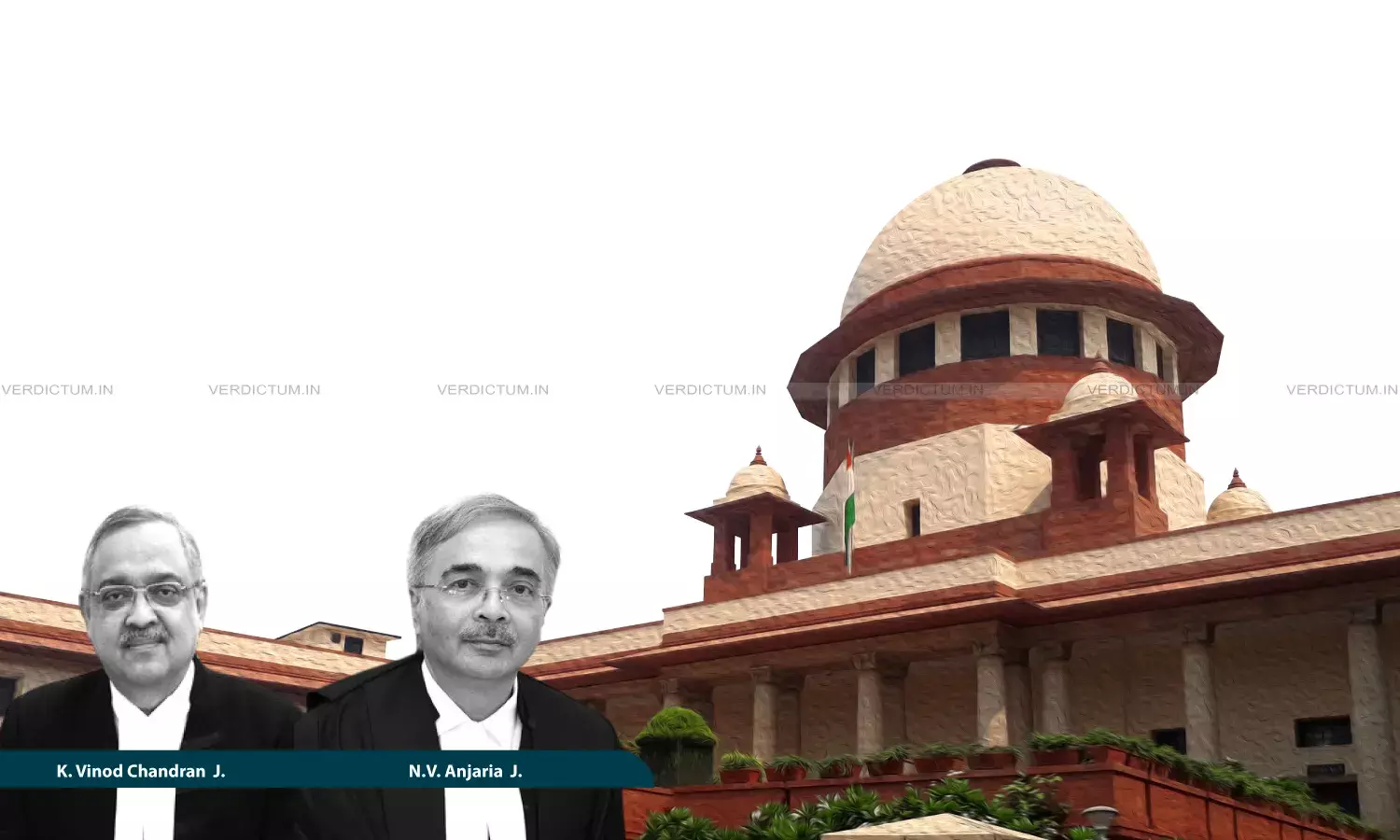Benefit Of Future Prospects’ Component For Motor Accident Compensation Can Also Be Given To Self-Employed Foreign National: Supreme Court
The original claimants approached the Supreme Court challenging the judgment of the Punjab & Haryana High Court disregarding the count of future prospects’ in computing the compensation.

Justice K. Vinod Chandran, Justice NV Anjaria, Supreme Court
While considering a motor accident case involving a self-employed foreign national, the Supreme Court has extended the benefit of future prospects’ component for the compensation payable to him as per the principles enumerated in the judgment in National Insurance Company v. Pranay Sethi (2017).
The appellants-original claimants had approached the Apex Court challenging the judgment of the Punjab & Haryana High Court to the extent that the High Court, even while enhancing the compensation in respect of accidental death, disregarded the count of future prospects’ in computing the compensation payable to the appellants/claimants/heirs.
The Division Bench of Justice K. Vinod Chandran and Justice N.V. Anjaria stated, “It deserves to be observed at this stage that the deceased was national of United States. Thus, he belonged to a foreign country and was found to be self-employed in that country.”
“Even as this Court is not oblivious to the said aspect, in order to determine the just compensation to a person who died in an accident occurred in India, the dictum of law in Pranay Sethi (supra) shall have to be followed and applied specially when no material evidence is offered to determine the future prospects in the foreign country. Accordingly, the Court is inclined to extend the benefit of future prospects’ component for the compensation payable as per the principles in Pranay Sethi (supra)”, it added.
AOR Yadav Narender Singh represented the Appellant while Advocate Abhishek Gola represented the Respondent.
Factual Background
The accident took place in the year 2007. One Rajinder Singh Mihnas died, who happened to be the husband of the first claimant and the father of the other claimants, who are the daughter and son, respectively. The deceased was travelling in a car along with his relatives. A truck, which was stated to be driven rashly and negligently, struck the car, resulting in the death of Rajinder Singh, aged 31 years. It was claimed that the deceased had been working as a driver and running a Transport company in the United States of America, claiming to be earning $ 9,600, equivalent to Rs 4,25,000 per month in Indian rupee. The deceased was a U.S. national, as the same was established from the evidence on record, including a copy of the permanent resident card of the USA, a copy of the passport of the daughter and the employment letter.
The claimants-heirs filed a claim petition under Section 166 of the Motor Vehicles Act. The Motor Accident Claims Tribunal took the view that there was no material on record to prove the daily wages paid in the USA. The Tribunal, accordingly, taking the income at Rs. 5000 per month, deducting the personal expenses, determined the compensation at Rs 7,80,000. In appeal, the High Court enhanced the income component from Rs 78,300 per month to Rs 1,17,20,200.
Reasoning
The Bench noted that the issue of additional future prospects’ came to be discussed and delineated by this Court in Pranay Sethi (supra), in which the Constitution Bench considered the parameters to be applied towards granting of future prospects’ benefit in case of a salaried person as also in respect of a self-employed person. It was held therein that the cumulative factors, namely, passage of time, the changing society, escalation of price, the change in price index, the human attitude to follow a particular pattern of life, etc., an addition of 40% of the established income of the deceased towards future prospects and where the deceased was below 40 years an addition of 25% where the deceased was between the age of 40 to 50 years would be reasonable.
“When the decision in Pranay Sethi (supra) hold the field today, the law laid down therein has to be applied to give benefit of future prospects’ to the appellants while determining the compensation. The rectification in the compensation amount awarded by the High Court by enhancing the same with inclusion of future prospects’ benefit and by further applying the principles for amounts awarding under the conventional heads as per the parameters laid down in Pranay Sethi (supra) is required to be adopted”, the Bench held.
Considering that the deceased was a national of the United States and was found to be self-employed in that country, the Bench held that the dictum of law in Pranay Sethi (supra) would have to be followed and applied specially in the absence of material evidence to determine the future prospects in the foreign country. The Bench also held, “As observed hereinabove, as per the decision in Pranay Sethi (supra), as the deceased was aged 31 years, 40% addition has to be made in the established income towards future prospects’.”
Referring to Pranay Sethi (supra), the Bench determined the reasonable figures under the conventional heads, namely loss of estate, loss of consortium and funeral expenses at Rs 15,000, Rs 40,000 and Rs 15,000 respectively. The Bench also granted Rs 1,60,000 towards loss of consortium.
Thus, partly allowing the appeal, the Bench granted additional compensation to the claimants to the tune of Rs 42,95,080 with interest. “The respondent-Insurance Company shall deposit the said amount of additional compensation with interest @ 6% within four weeks from today with the Tribunal, upon which the claimants shall be entitled to withdraw the same after undergoing the process of verification and identification before the Tribunal”, it ordered.
Cause Title: Kulwinder Kaur v. Parshant Sharma (Neutral Citation: 2025 INSC 950)
Appearance
Appellant: AOR Yadav Narender Singh, Advocates Mayank Kumar Singh, Giriraj Singh Yadav
Respondent: Advocate Abhishek Gola, AOR Viresh B. Saharya

